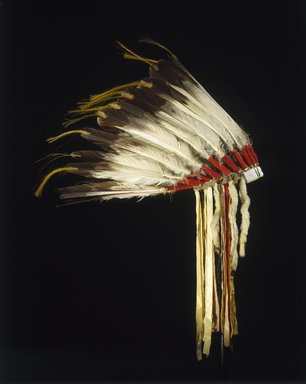
Artist:OsagePonca
Medium: Wool, felt, cloth, golden eagle feathers, horse hair, glass beads, hide, weasel fur, silk, sinew
Geograhical Locations:
Dates:late 19th–early 20th century
Dimensions: 16 1/2 x 22 x 22 in. (41.9 x 55.9 x 55.9 cm)
Collections:
Accession Number: X1053
Image: X1053_SL1.jpg,
Catalogue Description: Immature golden eagle feather headdress with a beaded headband. Base of feathers wrapped in red felt and made over a felt hat base. Streamers of weasel fur and cloth dangle from headband sides. These types of war bonnets were historically worn for special occasions and may occasionally be worn on the battle field (although men often wore one or two special feathers instead). A man earned the right to make one through his brave deeds. Initially he would be awarded a single feather for each deed; a coup, killing, or horse stealing success. Once he accumulated ten feathers he was generally given permission to obtain the eagle feathers for a full bonnet. Ideally they would have 28 eagle feathers and each may have additional notching to designate an event. The tips of the feathers could be tied with the horsehair if a man had counted many coups. Thus the bonnets became oral histories and each piece signified events in the warrior's life. Feathers were very valuable, i.e., 12 feathers equaled 1 horse. These were worn by warriors, not necessarily "chiefs". Only a few very high ranked warriors would have the bonnets with the long trailers down the back. Today bonnets are still made as recognition for achievements in life, dedication to their community as well as war participation. Golden eagles are a protected bird and Non-natives may not use them, buy them or transport them without special permits.